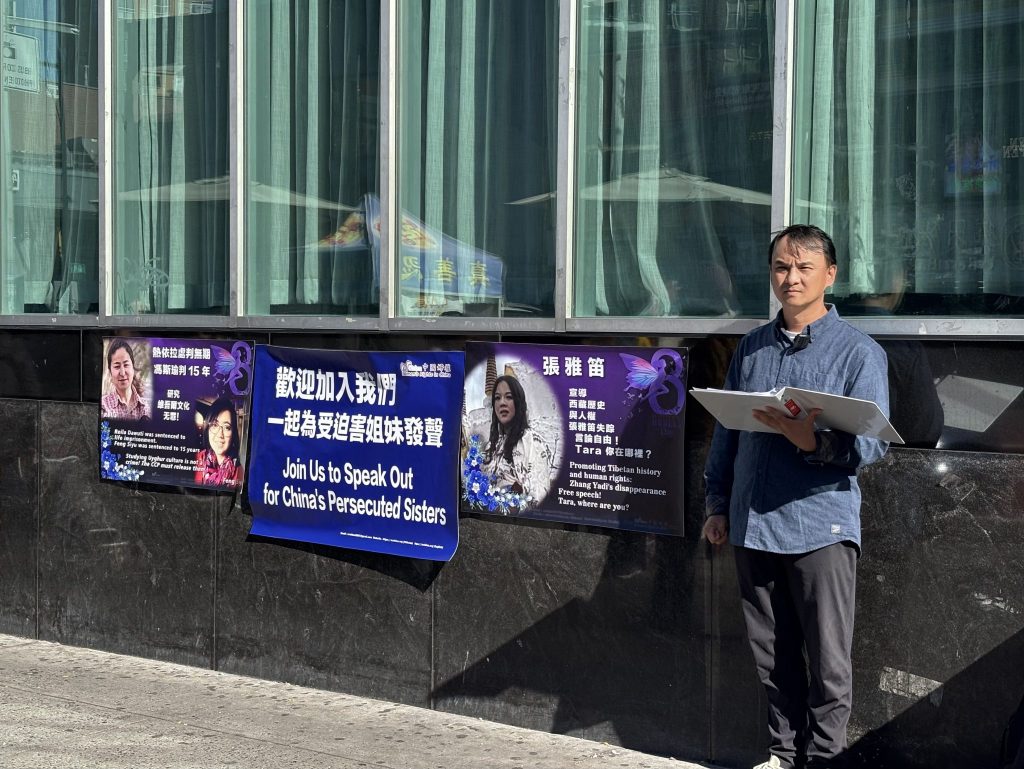Weekly Exhibition (Issue 2nd): WRIC Supporting Sisters in Prison Who Defend Their Rights
By WRIC Jiang, Dingcheng 10-27-2025
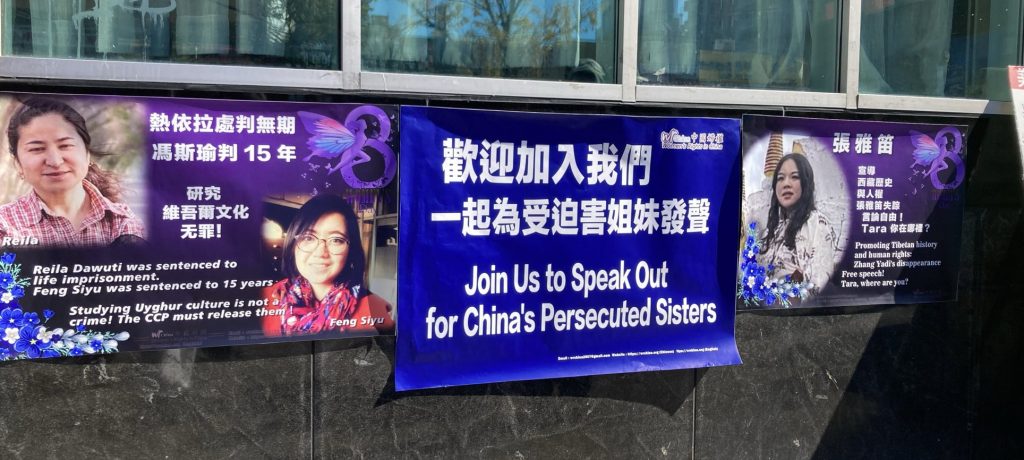
In Flushing, a bustling commercial district in New York City, a organization Women’s Rights in China (WRIC)members held a rally to support Tara Zhang (张雅笛), a female student, and scholars Reyila Dawuti (热依拉·达吾提) and Siyu Feng (冯斯瑜), who have been persecuted by the Chinese authorities. We call on the international community to pay attention to China’s continued persecution of dissidents, ethnic minority scholars, and human rights advocates.
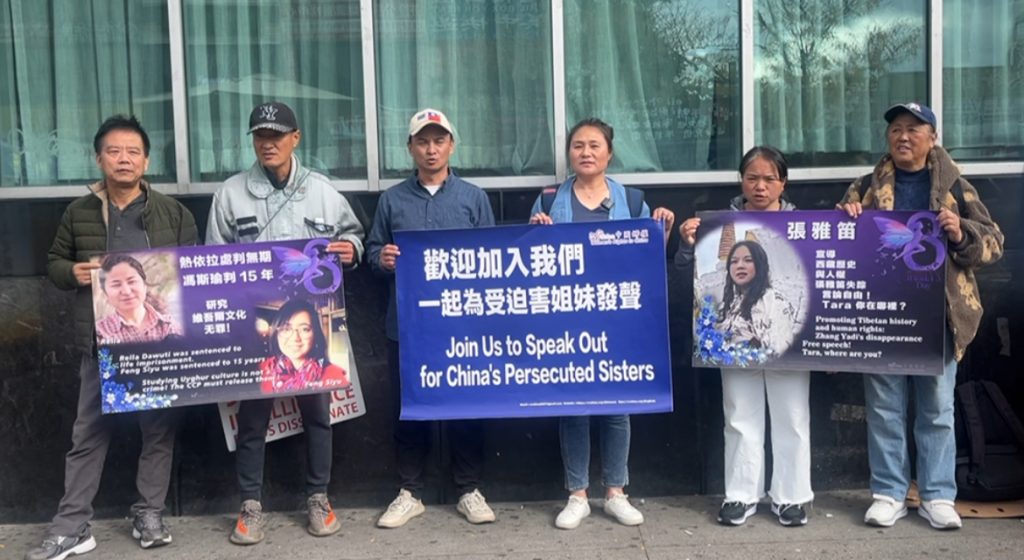
On October 25, 2025, members of the WRIC Association (from left to right): Yang Shisong, Mr. Li, Qiu Yueyun, Zhou Mei, Zhang Yan, and Wang Li, at an event outside the Flushing Library in New York. (Photo by WRIC Jiang, Dingcheng)
The Cost to the Younger Generation for Achieving Inter-ethnic Understanding
Tara Zhang is a 22-year-old Chinese student from Changsha, Hunan Province. She previously studied in France and was preparing to pursue a master’s degree in the UK. She is active on online platforms supporting Tibetan culture and the rights of ethnic minorities, and participated in founding or editing a Chinese-language platform called “Chinese Youth Stand for Tibet,” aiming to promote dialogue between Han and Tibetans and discuss ethnic issues.
On July 5, 2025, Tara Zhang returned to China to visit family, first going to Changsha, Hunan, and then to Shangri-La, Yunnan Province at the end of July.
Since July 30, she has lost regular contact with the outside world. Friends and her partner have tried to contact her multiple times without success, receiving only a few infrequent and unusual messages.
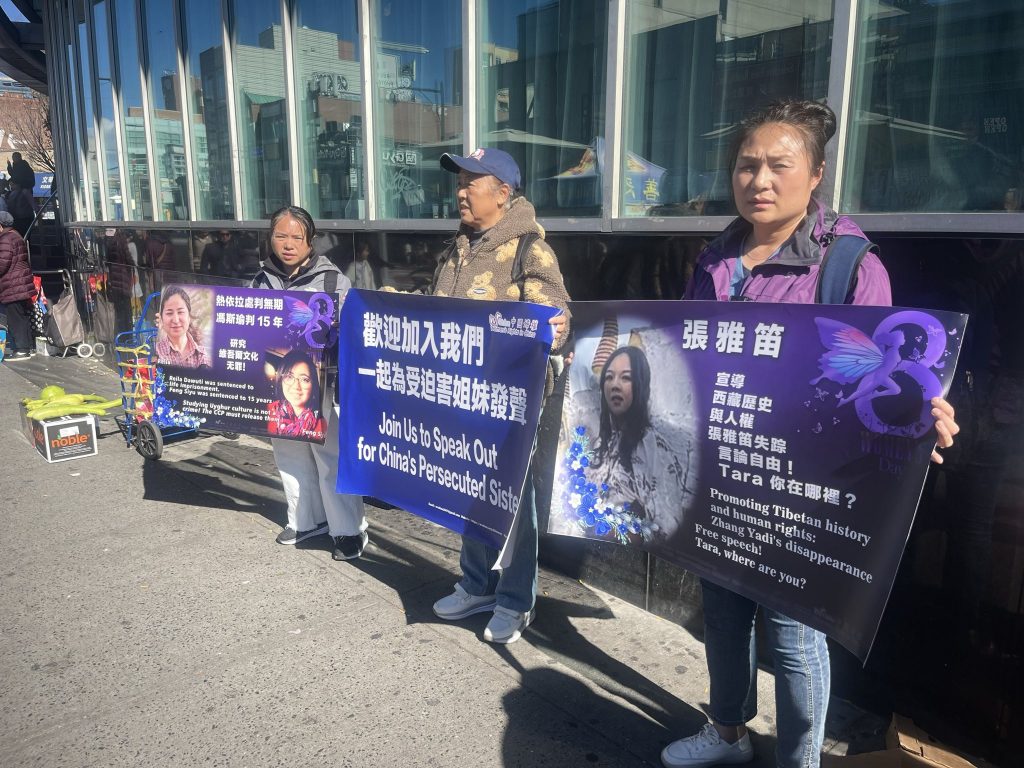
WRIC’s members (Start lift): Zhang Yan, Wang Li and Zhou Mei. (Photo by WRIC)

WRIC helps more Chinese people understand what is happening in China.

(Photo by WRIC)
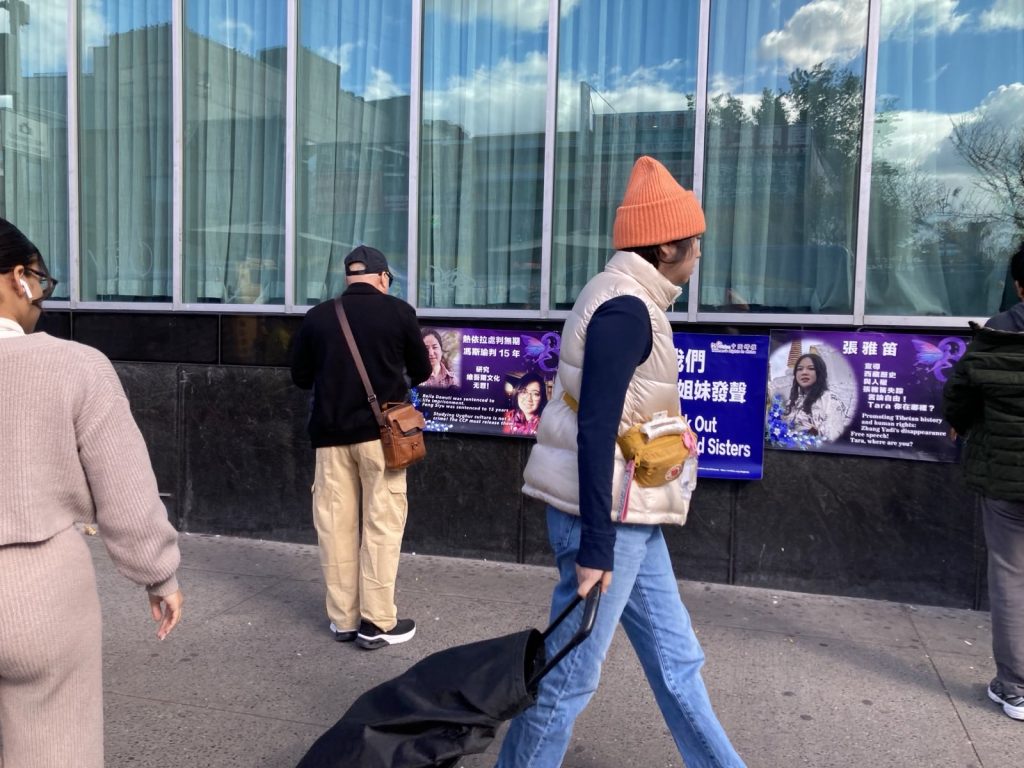
(Photo by WRIC)
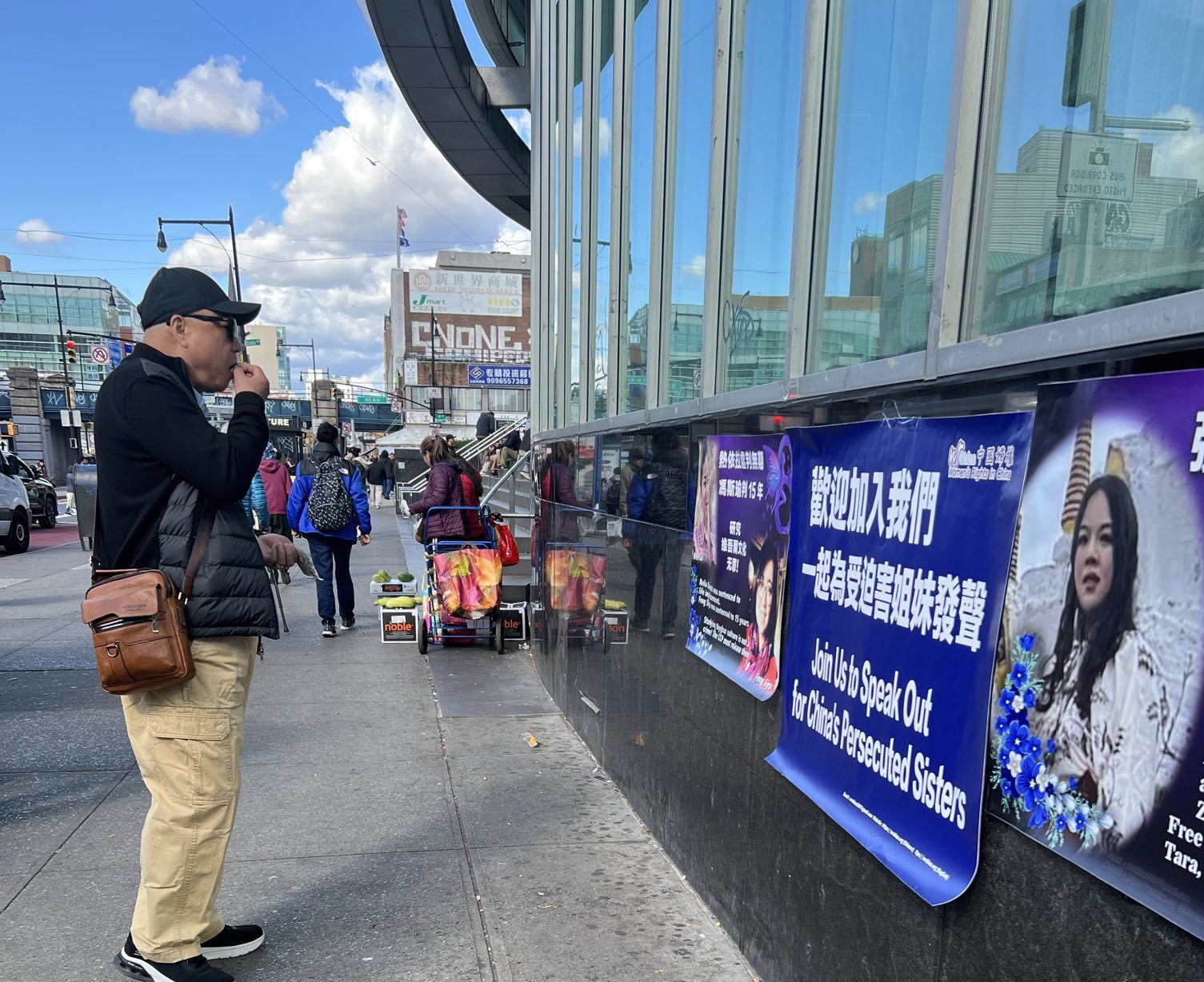
(Photo by WRIC)
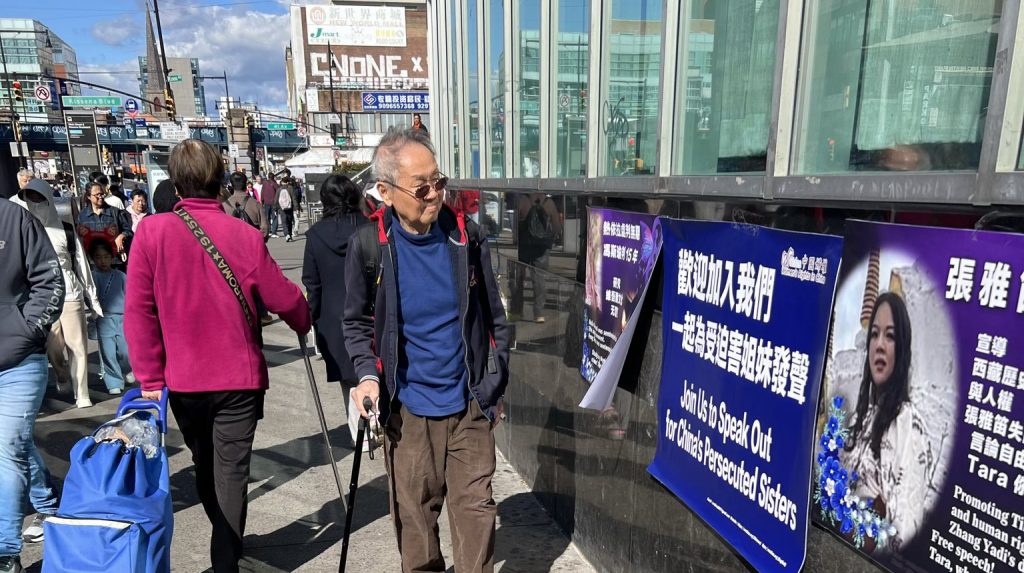
(Photo by WRIC)
Human Rights Watch has explicitly stated that she was detained in Shangri-La, Yunnan on July 31, 2025, and called on the Chinese authorities to “immediately and unconditionally release” Tara Zhang.
The human rights lawyer hired by her mother to provide assistance to her family in Changsha was briefly detained by the authorities on September 16, and his mobile phone was reportedly confiscated.
Tara Zhang’s lawyer has not yet been allowed to meet with her, and outside access is restricted. She may be charged under Article 103, Paragraph 2 of the Criminal Law of the People’s Republic of China for “inciting secession and undermining national unity.” If convicted, she could face 5 years in prison, and if deemed a “leader/organizer,” the sentence could be up to 15 years.
Tara Zhang had activities focus on cultural understanding and inter-ethnic dialogue between young Han Chinese and Tibetan communities, challenging the Han-centric perspective and ethnic prejudice, and attempting to understand and respect the culture, language, religion, and historical experiences of ethnic minorities, rather than viewing the entire Chinese society from the perspective, interests, or cultural habits of the Han Chinese.
However, in the official Chinese context, any “decentralized” discussion of ethnic issues (especially those involving the independence of Tibetan religious culture in Tibet and Xinjiang) is considered a risk of “separatism” or “challenging national unity.”
Politicized Academic Research
Rahile Dawut is a renowned folklorist and anthropologist from the Xinjiang Uyghur Autonomous Region of China, who has long dedicated herself to the study of Uyghur culture, religious sites, and folk traditions. She previously worked at Xinjiang University and founded the Center for Minority Folk Culture Studies.
In December 2017, Rahile disappeared while traveling to Beijing. It wasn’t until 2019 that the outside world learned she had been detained by the Chinese authorities.
Human Rights Watch reported on September 22, 2023, that Professor Rahile was convicted of “endangering national security” in a secret trial in December 2018 and sentenced to life imprisonment.
The U.S. State Department issued a statement on September 29, 2023, condemning the Chinese government’s sentencing of Professor Rahile, calling it an “outrageous verdict,” and calling on the Chinese government to release her immediately.
She has long studied the folklore, religious sites, and cultural traditions of the Uyghur people in Xinjiang. The New York Times noted that “China had long funded her research. In 2000, she met with President Jiang Zemin at a conference as a representative of Uyghur scholars. Her last project before her disappearance was funded by the Chinese National Social Science Fund. But it seems that the breadth and significance of her work is what got her into trouble.”

[Image caption: From left: Jiang Dingcheng, Wang Li, Zhou Mei. (Image from WRIC)
Another persecuted woman, Siyu Feng, is also a scholar of “Uyghur women’s folk culture.” She studied at Hangzhou Foreign Language School in Zhejiang Province and pursued postgraduate studies at the School of Oriental and African Studies (SOAS), University of London. In February 2017, she visited the Xinjiang University Folk Culture Research Center and collaborated with Rahile.
In October 2017, she was investigated by local police in Urumqi, Xinjiang, on the grounds that Feng had “foreign software” installed on her OnePlus mobile phone. Although the software was a pre-installed program and she had not used it, she was still criminally detained, arrested, and subsequently disappeared between January and March 2018. According to human rights organizations, Siyu Feng was secretly sentenced to 15 years in prison by the Tianshan District Court in Urumqi on charges including “endangering national security.”
Activities involving the recording and publication of Uyghur cultural content have been deemed politically sensitive under the current policies of the authorities, especially in the context of intensified national security control in Xinjiang. Academic research involving Uyghur culture and religion has been excessively politicized, and even without any actual political action, it is classified as “endangering national security.” The boundaries between cultural research and politics have almost disappeared.
Their sentences are not due to criminal acts themselves, but because academic research and cultural preservation activities have been politicized in the sensitive environment of Xinjiang, China. The charges of “subverting state power,” “picking quarrels and provoking trouble,” and “endangering national security” are vaguely defined and can be broadly interpreted, and are also used as all-purpose tools for prosecution.
Tara Zhang, Reila, and Siyu Feng represent the courage of women, ethnic minorities, and academics in pursuing truth and freedom under an authoritarian system, and also the common predicament under such a system. They are not criminals, but voices in Chinese society that are huddled in the corners and need to be heard.
